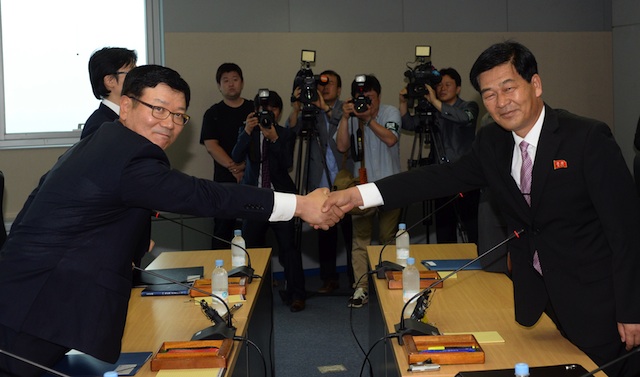SUMMARY
This is AI generated summarization, which may have errors. For context, always refer to the full article.

PAJU, South Korea – South Korea said talks with North Korea on reopening a jointly-run industrial estate ended without agreement Wednesday, July 10, but the two sides agreed to meet again next week.
The South’s chief delegate Suh Ho said talks on restarting the Kaesong industrial complex’s mothballed factories would continue on July 15, after about four hours of meetings that started Wednesday morning.
“We both agreed that the complex should be maintained and further developed,” Suh told reporters at the site just inside North Korea.
“The North argued that it should be resumed as soon as machinery checkups are finished, while we pointed out that the same situation could be repeated even after the reopening if there is no firm guarantee on preventing a recurrence (of the shutdown).
“So it was decided that this issue would be discussed at the next meeting,” he added.
The talks follow months of cross-border friction and threats of war by Pyongyang after its February nuclear test attracted tougher UN sanctions, further squeezing its struggling economy.
Kaesong shut down three months ago as relations between the frosty neighbors hit crisis point.
But at a rare weekend meeting the North and South agreed in principle to reopen Kaesong, the last remaining symbol of cross-border reconciliation.
Earlier Wednesday, a vehicle convoy of about 130 South Korean delegates, support staff and factory owners crossed at Paju over the heavily fortified demilitarized border zone that underscores the ever-present tension between two nations, which remain technically at war. Their 1950-53 conflict ended in a ceasefire rather than a peace treaty.
The vehicles were outfitted with bright red flags, following border rules aimed at preventing an accidental shooting.
Desolate industrial zone
The once-buzzing industrial zone — which had previously remained largely resilient to turbulence in relations — had the air of a ghost town, according to pool reports from Kaesong.
Factories and convenience stores were shuttered and dark, traffic signals were off and North Korean workers plucked overgrown weeds from the sidewalk outside the 15-story building where the talks were held.
Some South Korean factory owners, who visited their plants on the sidelines of the talks, described equipment that had rusted in the damp summer heat, and warned that the shutdown meant some business would be lost for good.
“Officials are holding talks about reviving Kaesong, but businessmen like us feel that we can’t reopen factories unless the North promises that the current situation won’t be repeated,” said one who asked not be named.
“Without such a promise, what kind of buyers will give us orders?”
Another said he told a North Korean official that business would likely be half the pre-shutdown levels.
“I told him the North was the one that closed the complex anyway so they needed to apologize,” the South Korean businessman said.
Tensions
Kaesong, which was built in 2004, sits about 10 kilometers (six miles) inside North Korea. The South Korean-funded site, built as part of a diplomatic bid to improve cross-border relations, was an important source of hard currency for the impoverished North.
In April Pyongyang withdrew its 53,000 workers from the 123 Seoul-owned factories at the complex, citing military tensions and what it called the South’s hostility.
Seoul withdrew managers from most of the operations in early May.
The South now wants firm safeguards from the North against shutting Kaesong down unilaterally, to keep the estate insulated from changes in relations.
This would be a bitter pill for the North to swallow as it means it would accept responsibility for the April closure.
The South also wants compensation for losses stemming from the suspension, a demand that the North is unlikely to accept.
At the end last Sunday of grueling 15-hour talks, the two sides said in a joint statement that they had agreed to let South Korean firms restart their plants at the complex when conditions are ripe.
The statement was seen as a crucial step in winding down the months of high tension. – Rappler.com
Add a comment
How does this make you feel?
There are no comments yet. Add your comment to start the conversation.